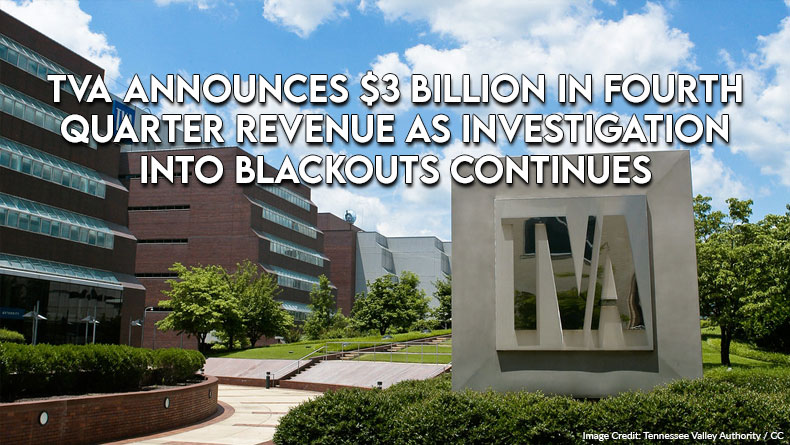Photo: TVA offices in Chattanooga, Tennessee Photo Credit: Tennessee Valley Authority / CC
The Center Square [By Jon Styf] –
The Tennessee Valley Authority announced Tuesday it made $3 billion in operating revenue in the final three months of 2022.
The revenue came as TVA faced what it called the first temporary blackouts in the energy company’s 90-year history in late December, something the company apologized for and has vowed that it is fully investigating.

President & CEO Jeff Lyash discussed the storm and the outages on Tuesday’s first quarter earnings call, saying temperatures dropped by 40 degrees in a “matter of hours” accompanied by gale force winds.
“The intensity of scale and duration of this event was significant,” Lyash said.
Lyash noted power demand records were set Dec. 23 with 740 gigawatt hours of energy, enough power to serve 70,000 homes for an entire year.
“We’ll be highly self-critical and we’ll identify all the actions we can take to minimize the likelihood of this again,” Lyash said of the investigation. “Or if it does occur, which is always a possibility, that we perform better and that we coordinate better with our local power companies.”

The TVA power issues led it to demand local power companies reduce electricity load by 5% for two hours and 15 minutes on Friday and then 5% to 10% reductions on Saturday for five hours and 40 minutes.
TVA is the largest public power corporation in the country, generating 90% of the state’s electric generating capacity and three-fifth of its power plants. It is federally owned and serves 10 million by providing electricity to 153 local power companies.
The top source of electricity generation in Tennessee is nuclear power plants, which provide 47% of the state’s electricity while 20% comes from natural gas and 18% from coal. All three of the TVA nuclear plants — Brown’s Ferry (Alabama) and Sequoyah and Watts Bar (Tennessee) — were generating power at 100% capacity during the cold snap, according to data from the U.S. Nuclear Regulatory Commission.
Meanwhile, the fourth-quarter revenue numbers were a 17% increase over the same timeline in 2021.

Lyash noted that TVA recently announced that it will be retiring the Cumberland Fossil Plant in two stages, with one unit shut down by the end of 2026 and the other by the end of 2028.
TVA will replace the first unit with a 1,450-megawatt natural gas facility by 2026 and will announce a replacement for the second unit in the future.
The Cumberland plant, in Stewart County, is the final coal plant operated by TVA. It currently powers 1.1 million homes.
“TVA selected gas to replace the first unit as the best overall solution because it provides low cost, reliable and cleaner energy to the system,” Lyash said, adding that the transition will reduce carbon emissions by up to 60%.


About the Author: Jon Styf, The Center Square Staff Reporter – Jon Styf is an award-winning editor and reporter who has worked in Illinois, Texas, Wisconsin, Florida and Michigan in local newsrooms over the past 20 years, working for Shaw Media, Hearst and several other companies. Follow Jon on Twitter @JonStyf.




One Response
The TVA has made a bad choice by closing its reliable coal-fired power plants. Coal is abundant and cheap. It can be stored safely. Its price is relatively stable.
By comparison, natural gas prices are very volatile. The only way to store it is to “stockpile” it in liquid form and at a super-cold temperature – not exactly hazard-free. When a coal train derails there is a coal spill that can be easily cleaned up. When a natural gas pipeline fails there is usually an explosion. LNG terminals and pipelines are also attractive terrorist targets, coal trains not so much.
I am aware of the spill at the Kingston Power but trading a long-term and reliable coal-fired steam-electric plant for a natural-gas fired plant that relies on high-volume hydraulic fracturing to extract gas from the ground is not without its adverse environmental consequences, either. There is a price to be paid for living in an industrialized society with its comforts as opposed to a romanticized pre-industrial existence that was actually harsh with associated incurable diseases, short life-spans and feudal society.
And don’t even get me started on the downsides of wind and solar both of which I’m eminently qualified to comment on.